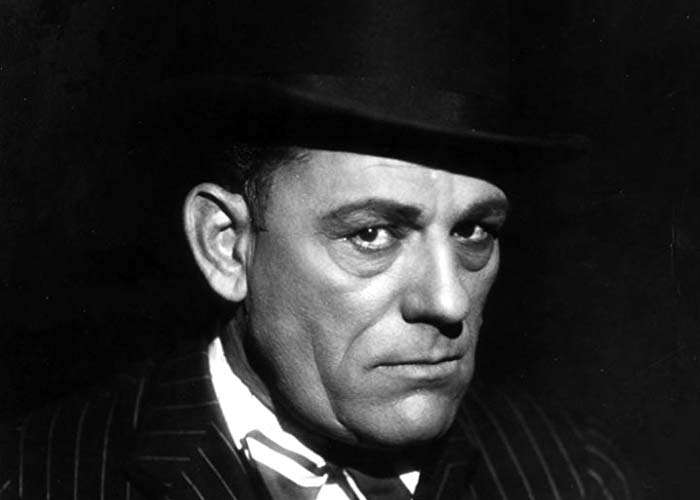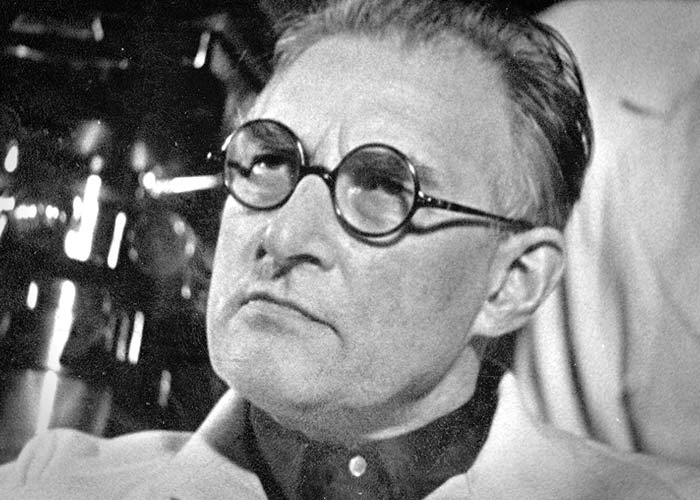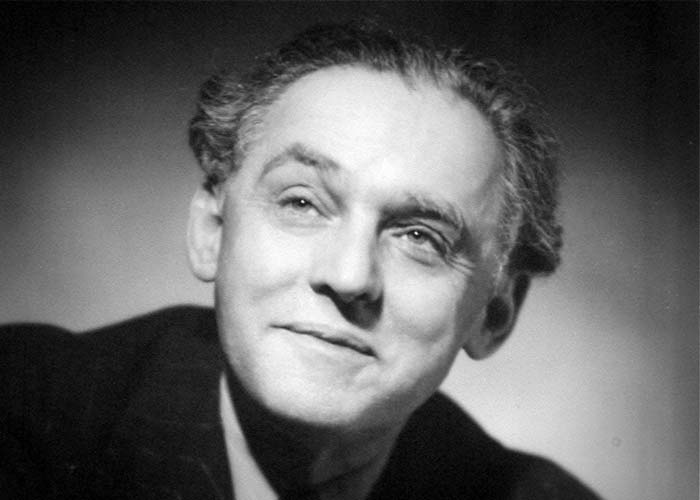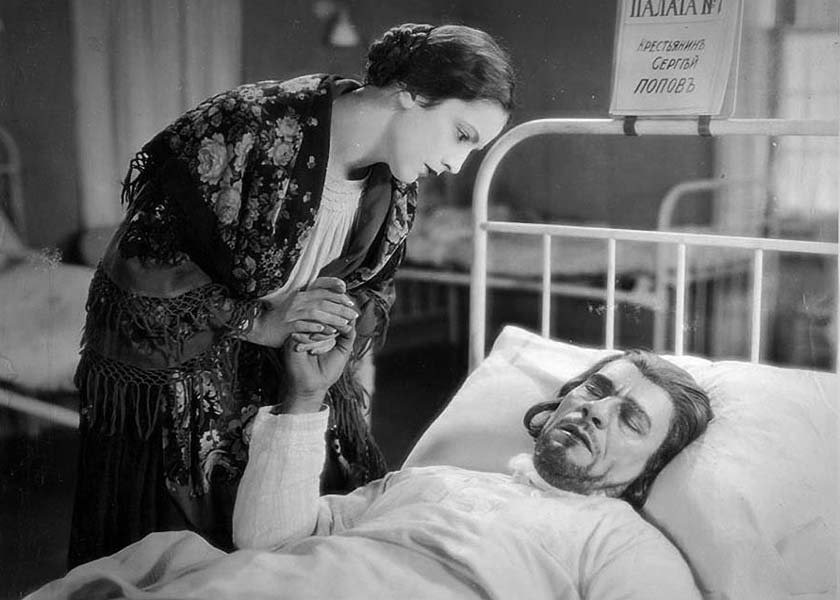Synopsis
A rather aristocratic looking woman (Bedford), dressed as a peasant, asks ignorant peasant Sergei (Chaney) to guide her to Novokurst. She tells Sergei that she will always be his friend if he can help her. They stop at a small house to spend the night, and a band of roving revolutionaries finds them. Although they beat him, Sergei maintains that the woman is his wife. They are saved when elements of the Imperial Army ride up, and the revoltionaries flee. The woman is actually the Countess Tatiana Alexandrova carrying secret plans for the army. The soldiers take the Countess and Sergei to Novokurst.
At the city, Sergei is treated in the hospital. The Countess stays at the home of rich business man Vladamir Gaidaroff (Swain). After Sergei recovers, he goes to the Countess and asks for her friendship. She is friendly in the manner of a noblewoman to a servant. Never intending to make a personal friend of a poor, ignorant peasant, she repays Sergei for his services by getting him a place in the kitchen. Sergei is surprised and disappointed by her response to his friendly approach.
Ivan, a kitchen servant, supports the revolutionaries and tells Sergei that they will soon be equal to those upstairs and then Sergei can have the countess. Sergei is unsure, but when he sees the countess kissing her lover Captain Dimitri (Cortez) he becomes more receptive to the words of Ivan.
The Imperial troops leave Novokurst to fight the revolutionary armies, and Gaidaroff, his wife, and the Countess are left with only two soldiers to guard them. The people of the town flee as the revolutionaries invade. Ivan tell Sergei that he will have the Countess first. Enraged, Sergei locks him in the cellar. Meanwhile, Gaidaroff and his wife flee. Only the Countess remains.
Sergei goes looking for the Countess and attacks her. She flees. They are struggling when the soldiers return, and Sergei runs off. Captain Dimitri rushes in and embraces the Countess. The soldiers bring in a young revolutionary who was shooting at them, and the Captain orders him shot, explaining that they cannot forgive attackers. The soldiers bring Sergei to the Captain. The Countess saves his life by saying that he was the only one trying to protect her. Sergei is grateful for her forgiveness.
The Captain leaves the house to attend to his troops. Ivan, who has escaped from the cellar, and two revolutionaries seek the Countess, and Sergei fights them to protect her. Sergei is grievously wounded before the Captain and his soldiers arrive. Countess Tatiana and Captain Dimitri thank Sergei for his bravery and pledge that he will always be with them as their friend. Sergei dies content.
Discussion
By 1927, Lon Chaney had been in films for 14 years and had played a variety of
characters, demonstrating his skill and powerful presence in every role. His five
films of 1927, made for MGM, are representative of the diversity of his roles: a
tough but likable sergeant in the comedy-drama
Tell It To the Marines, a revengeful Chinese mandarin in the
melodramatic Mr. Wu, a circus knife thrower who has his arms cut off
to gain love in The Unknown, the ignorant and crude peasant of
Mockery, and a Scotland Yard inspector disguised as a vampire in
London After Midnight. The public esteemed his ability to
convincingly assume many unique, and often grotesque, characterizations and
regarded the sobriquet, man of a thousand faces
as entirely appropriate.
Chaney was probably the only actor of the 1920s who was a big box office draw
despite his lack of good looks and sex appeal.

In Mockery, Chaney has an unusual role, unlike the frightening and powerfully repellent characters he often portrays. The Russian peasant Sergei is ignorant, sullen, lethargic, and pathetic. In common with many of Chaney's other characters, however, Sergei longs for the love of the beautiful heroine, Countess Tatiana. He mistakes her gratitude as extending the friendship of equals. His disappointment and depression is used by the Communistic cook to turn him against her. His pursuit of her as she flees terrified is the highlight of the film. He atones for this behavior by dying to protect her.
According to an article in The New York Times (July 24, 1927), the
intention of Mockery producer Erich Pommer and writer-director
Benjamin Christensen was to provide Chaney with an
arresting characterization.
They planned to have Chaney’s peasant become
crazed by newly acquired power.
In the film, this
new power
stimulates the crazed Sergei to pursue the Countess through her
rooms. The resulting scene is fairly strong, but since the audience knows that,
within the context of the film, the peasant will not assault the Countess, the
chasing round and round is not as thrilling as it might have been. Chaney’s acting
is excellent, and in the pathetic Sergei, he has an unusual if perhaps not an
arresting
character.
Despite the presence of Chaney, the film was not a popular success. The heavy
drama lacked the familiar Chaney grotesqueries and did not compensate with a
sufficiently compelling story. Because Chaney was a huge draw, the film made money
but was not as profitable as his other films of 1927. Contemporary reviews were
mostly disparaging. Film critics praised the Chaney's acting, but generally panned
the film. Variety appraised the film as
dull, trite and uninspiring,
a hodge-podge of half-formed ideas.
In
The New York Times, Mordaunt Hall wrote that the film had
…little drama and hardly any suspense…the incidents are seldom
convincing.
The Photoplay reviewer was more positive,
…hardly an authentic picture of the budding revolution but is good
melodrama held up to a keen edge of tensity by Lon Chaney’s highly effective
character playing.
Heroine Barbara Bedford, whose screen persona is warm-hearted and gracious, projects the necessary mixture of sympathy and repugnance towards the peasent Sergei. Bedford's career began in 1920 with a supporting role in the William S. Hart feature Cradle of Courage. Also in 1920, she played Cora Munro under Maurice Tourneur's direction of The Last of the Mohicans. Never a star, Bedford played the love interest in many silent features, co-staring with leading men such as John Gilbert, Charles Ray, and Tom Mix. In 1925, she played Hart’s heroine in his last film, Tumbleweeds. During the 1930s, her roles declined to minor supporting parts and finally to uncredited walk-ons. In 1945, at age 42, she made her last film, Girls of the Big House, at Republic Studios, and retired.

Benjamin Christensen began his film career in 1913 as an actor and director in his native Denmark. He spent several years making his masterpiece, Häxan: Witchcraft Through the Ages (1922), a fictionalized documentary of the malevolent acts of the devil and witches from medieval times to the present. It is the work by which Christensen is remembered. This unique film depicts individuals of all ages and ways of life, including many religious figures, living in feverish abandon under the influence of the Devil. The film was censored everywhere it was shown and it did not recoup it's high cost; consequently, Christensen was forced out of the Scandinavian film industry with a reputation for extravagance.
After several films in Germany, Christensen signed with MGM in 1925 and moved to Hollywood. His first film for MGM was the successful Devil’s Circus (1926) starring Norma Shearer and Charles Emmett Mack. Mockery, his second Hollywood film, was modestly successful largely due to the presence of Chaney. Mysterious Island (1929), a science fiction film starring Lionel Barrymore, was started at MGM in 1926 but delayed due to technical problems and the addition of dialogue sequences, and Christensen did not receive screen credit for his work on this film. Dissatisfied with MGM’s approach to filmmaking, Christensen signed with First National Pictures where he made four low-budget films, including Seven Footprints to Satan (1929) a nice old dark house thriller. In 1935 Christensen returned to Denmark where he made four films during the WWII period of German occupation. His final film was the unsuccessful espionage thriller Lady With the Light Gloves (1942). After the war, Christensen, who could not get financing for any new projects, accepted a government pension as manager of a small provincial cinema, where he remained until his death in 1959.

Producer Erich Pommer (1889-1966) had been an executive at Germany's famous film studio Universum Film AF (UFA), where he produced such eternal masterpieces of world cinema as Murnau's The Last Laugh (1922) and Faust (1926), and Lang's Metropolis (1927). In May, 1926, after a disagreement with the CEO and Board of Directors, Pommer left UFA and moved to Hollywood. He joined Famous Players-Lasky Corporation (later known as Paramount Pictures) and supervised two Pola Negri films. In January 1927, after disagreements with the heads of production at Paramount, Pommer severed his connection with the studio. In March, 1927, he signed a contract with Metro-Goldwyn-Mayer as an associate producer. He joined with Christensen, another new contractee at MGM, to make Mockery and was an uncredited producer on several other films. In November, 1927, Pommer left MGM and returned to UFA. After Hitler came to power, he left Germany and returned to Hollywood.
Further Reading

